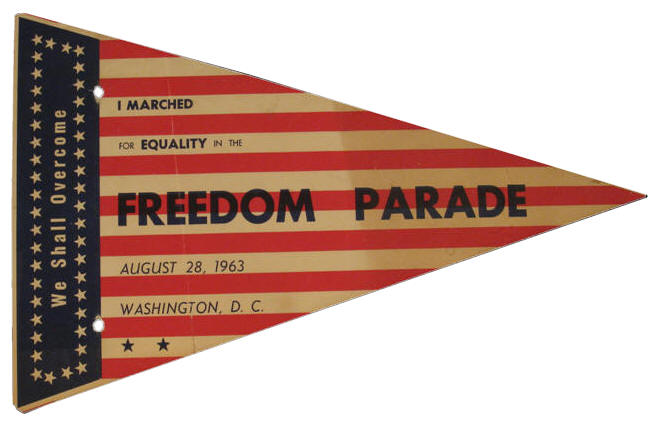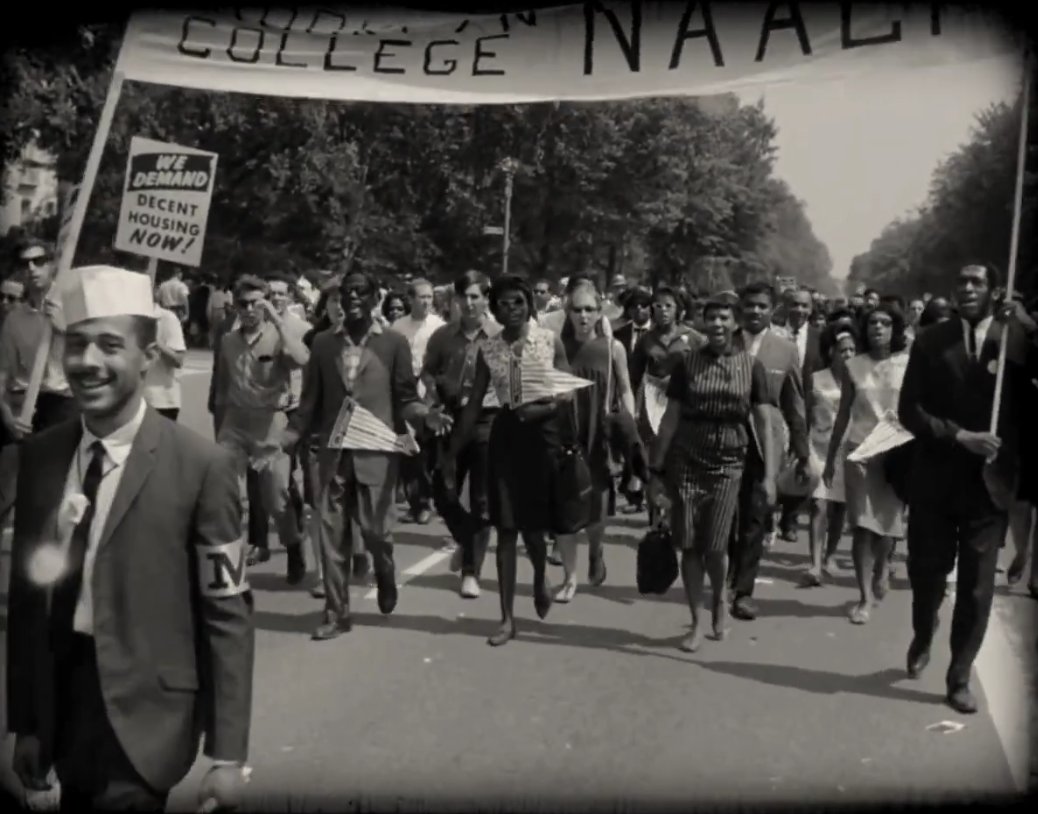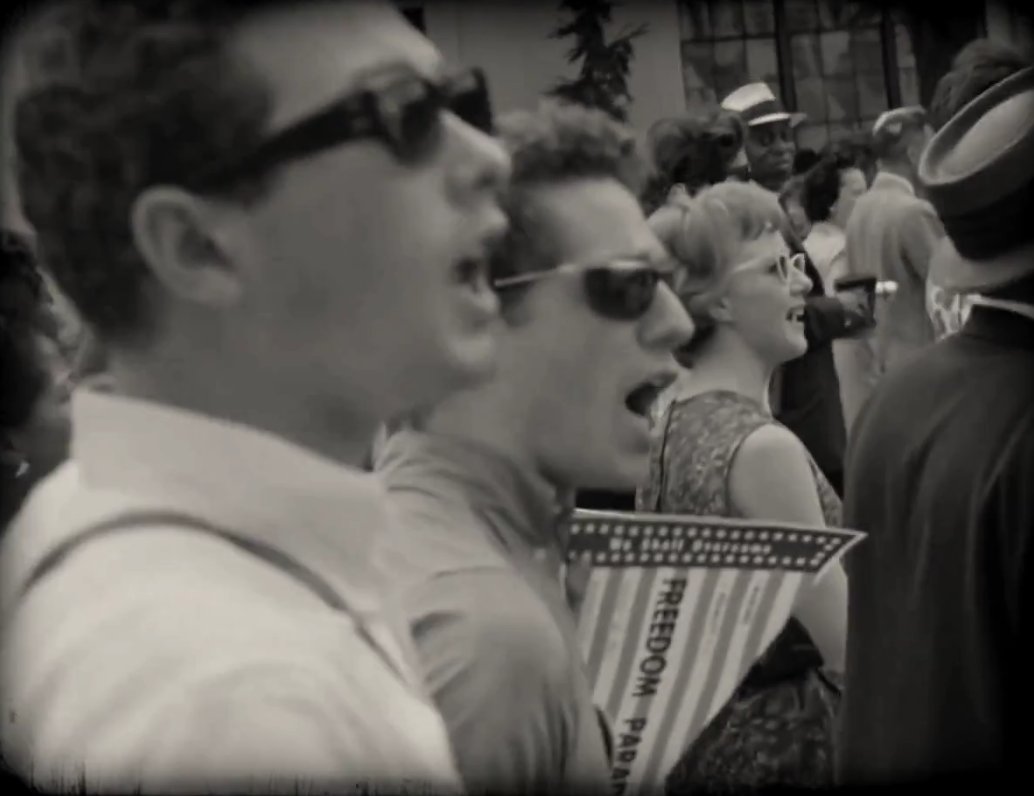
This is one of the
rarest and most patriotic surviving items from the Civil
Rights era. This paper pennant was printed for,
and carried in, the March on Washington for Jobs and
Freedom on August 28, 1963, known at the time as the
Freedom Parade.
In the pennant's
canton, surrounded by 42 stars, is the immortal rallying
cry of the Civil Rights Movement, "We Shall Overcome",
the only use of this phrase that I've ever witnessed on
any form of the American flag. The phrase derives
from the song "We Shall Overcome", which itself derives
from the gospel song "I'll Overcome Someday". On the day
of the march, Joan Baez sang the song "We Shall
Overcome" to over 300,000 people in attendance at the
Lincoln Memorial. It was on this day, too, that
Dr. Martin Luther King delivered one of the most
important speeches in American history, which would
galvanized the Civil Rights Movement and immortalized
Dr. King's historic words. This pennant was
carried by Ms. Theresa Gehring. After acquiring
the pennant, I was privileged enough to receive the
following letter from Ms. Gehring, describing in her own
words her experience of participating in the march and
of witnessing Dr. King's historic speech first hand.
The March on Washington, 1963
I attended the March on Washington by
chance. I was working in Washington, DC that
summer as a paid summer intern at the U.S.
Department of Agriculture. I had returned to
school in my later years and was between my
junior and senior year at the University of
Connecticut. I was staying that summer at
the house of the University of Maryland
chapter of my fraternity, Alpha Gamma Rho,
in College Park, Maryland. A fraternity
sister from the University of Illinois
chapter also stayed at the house and worked
at USDA, so we went to work together.
For the day of the march, the Federal
Government encouraged its employees who
worked downtown to stay home and adopted a
“liberal leave” policy, which meant that you
were not required to work but if you didn’t
you had to take a day of annual leave. (I
don’t remember if they called it “liberal
leave” back then, but that is the term
today.) As I was a temporary hire, I did not
get annual leave, so if I had taken the day
off, I would not have been paid, and I
needed all the money I could save for
college expenses.
There was quite a bit of fear about the
march. People were afraid that it would end
in riots. And the civil rights movement was
not popular in the South, it not surprising
to note. There was not much sympathy among
my Maryland fraternity sisters (some of whom
has a pretty southern accent to my Yankee
ears.) Personally, I was very supportive of
integration. We had even tried,
unsuccessfully, to integrate our chapter of
Alpha Gamma Rho at U-Conn, but that is
another story.
In any case, my fraternity co-worker decided
not to go to work that day. So I had to take
a bus downtown. The bus was full of black
people (called negroes or colored folks
then), going down to the march, and to my
happy surprise, they were in a very festive
mood.
I went to the USDA to work for the morning.
The USDA is the only USG department located
right on the Mall (all the other buildings
on the Mall are either Smithsonian museums
or monuments. The main and oldest building
is on the mall at 14th street, north of
Independence and the building I worked in
was across Independence on the south side.
As I was located right in the middle of the
action, I decided to go out to see what was
going on during my lunch hour. I walked
across the mall to Constitution and joined
the throngs of people walking towards the
Lincoln Memorial.
Everyone was in a very festive mood. I got
close enough to the Lincoln Memorial to see
and hear what was going on. To my delight
Joan Baez was singing. I had heard her in
Hartford a year or so earlier and she was my
favorite folk singer. Back as school, a
friend of mine used to practically worship
at the record player as we sat and listened
to her singing. It was ironic that she was
at the march, because the Daughters of the
American Revolution had refused to let Joan
sing at Constitution Hall so she sang
instead at the march, and I got to hear her
for free. There were also speeches, but I
don’t remember all the speakers that
afternoon. The one speech I do remember was
MLK’s speech. You could have heard a pin
drop when MLK stepped up to the microphone.
With the mass of people attending this was
really something. I remember his voice was
strong and his speech offered hope to those
who had long suffered the effects of their
color. The flags were waving and cheers at
times would drown out the speaker so that he
would repeat himself. The fear that the
government spread of violence was not to be
seen. Here was hope for a better future and
life for all. Shoulder to shoulder we stood
all the colors of the melting pot called
America. Hate and fear had no place here.
Someone had heard the call of the people and
stood strong to support it. MLK’s dream
spread through the crowd on waves of peace.
He promised to carry the banner and the mass
of people believed him. Finally a voice came
into the light from out of the darkness. His
dream of equality for all was heard. A dream
filled with hope not hate. A dream that
touched all who heard it. Everywhere around
me people smiled united in hope. Prayers
were said and marchers joined hands. Voices
were raised not in anger but in peace and
love for what surely would come from so
great a man. Once the speech ended the crowd
slowly milled toward their own destiny. The
police surrounding the mall were ready for
an outbreak that was not to come. MLK had
reached the hearts of hope for a better day
for all. Each individual in that crowd knew
that his dream would spread around the
country and that change will come. Today was
a new day. Tomorrow would be better. This
was the time and MLK was the man who would
bring the dream to life.
In any case, after an hour or so, I went
back to work, and took the bus home in the
evening without incident. All in all, it was
an exciting event at an exciting time.
Theresa Gehring
Recited to my son Robert Gehring on this day
August 23, 2009 |
|
|
 |
 |
|

